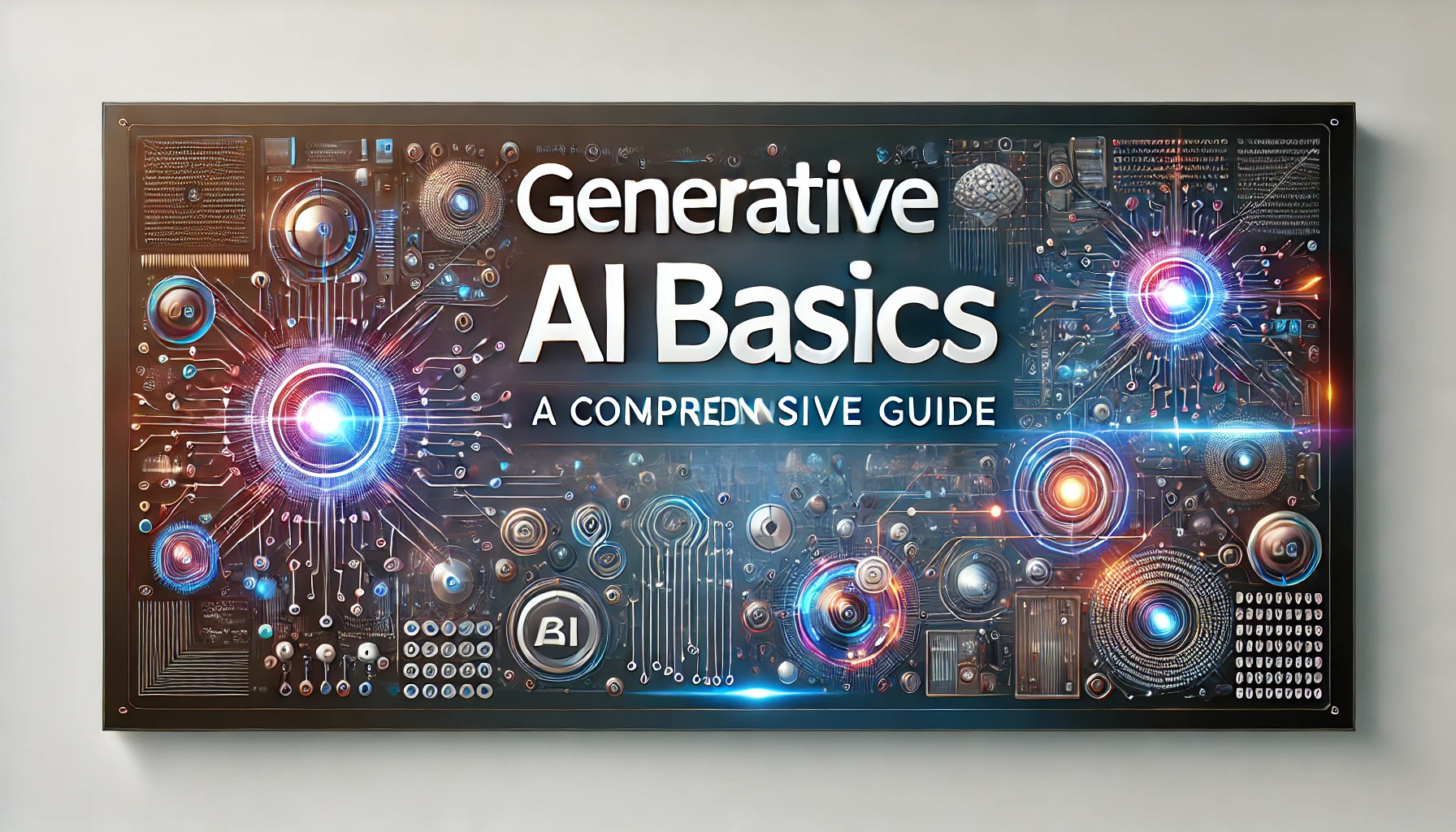Generative AI Basics: A Comprehensive Guide

Overview
Introduction
In recent years, Generative AI has emerged as a revolutionary technology, transforming industries from entertainment to healthcare. Understanding the basics of generative AI is crucial for anyone looking to leverage its potential. This guide on Generative AI Basics will provide you with a thorough overview, explaining what generative AI is, how it works, its applications, and much more.
What is Generative AI?
Generative AI refers to a subset of artificial intelligence that focuses on creating data that is indistinguishable from real data. This includes generating images, text, music, and other forms of content. Unlike traditional AI models, which are primarily used for prediction and classification, generative AI models create new content based on the data they have been trained on.
How Does Generative AI Work?
At the heart of generative AI are neural networks, particularly Generative Adversarial Networks (GANs) and Variational Autoencoders (VAEs). These models learn from vast amounts of data and generate new data by identifying patterns and structures. GANs, for instance, consist of two neural networks—the generator and the discriminator—that work in tandem to create and evaluate data, refining the output until it is as realistic as possible.
Applications of Generative AI
Generative AI Basics encompasses a wide range of applications across different sectors:
- Art and Design: Generative AI can create stunning artworks, design prototypes, and even fashion collections.
- Entertainment: In the gaming and film industries, generative AI is used to create characters, environments, and even entire scenes.
- Healthcare: AI models generate synthetic medical data for research, design drugs, and create personalized treatment plans.
- Marketing: Content creation for advertising, social media, and other marketing materials is enhanced using generative AI.
- Education: Generative AI develops customized learning materials and interactive educational content.
Advantages of Generative AI
- Creativity: Generative AI augments human creativity by providing new ideas and perspectives.
- Efficiency: Automating content creation saves time and resources.
- Innovation: It opens up new possibilities for innovation in various fields.
- Customization: Personalized content generation tailored to individual preferences and needs.
Challenges and Limitations
While the potential of Generative AI Basics is immense, it is not without challenges:
- Data Dependency: High-quality and large datasets are required for effective training.
- Ethical Concerns: The potential for misuse in creating fake news, deepfakes, and other malicious content.
- Complexity: Developing and training generative AI models is complex and requires significant expertise.
- Bias: The models can inadvertently perpetuate biases present in the training data.
The Future of Generative AI
The future of generative AI looks promising with advancements in technology and increasing adoption across industries. Researchers are continually working to improve the models, making them more efficient, ethical, and accessible. As these technologies evolve, they will become integral to various aspects of our daily lives, from creative arts to scientific research.
Conclusion
Generative AI Basics provides a foundation for understanding the transformative potential of this technology. By comprehending its workings, applications, advantages, and challenges, you can appreciate the impact generative AI has and will continue to have on our world. As we move forward, the role of generative AI will only expand, paving the way for innovations we have yet to imagine.
Frequently Asked Questions (FAQs)
-
What is Generative AI? Generative AI is a type of artificial intelligence that creates new content, such as images, text, and music, by learning from existing data.
-
How does Generative AI differ from traditional AI? Traditional AI focuses on prediction and classification, whereas generative AI creates new content based on patterns learned from data.
-
What are some common applications of Generative AI? Common applications include art and design, entertainment, healthcare, marketing, and education.
-
What are GANs and VAEs? Generative Adversarial Networks (GANs) and Variational Autoencoders (VAEs) are types of neural networks used in generative AI to create new data.
-
What are the advantages of using Generative AI? Advantages include enhanced creativity, improved efficiency, innovative possibilities, and the ability to customize content.
-
What challenges does Generative AI face? Challenges include data dependency, ethical concerns, complexity, and potential biases in generated content.
-
How is Generative AI used in healthcare? In healthcare, generative AI is used to generate synthetic medical data, design drugs, and create personalized treatment plans.
-
Can Generative AI be used in marketing? Yes, generative AI is used in marketing to create content for advertising, social media, and other promotional materials.
-
What ethical concerns are associated with Generative AI? Ethical concerns include the creation of fake news, deepfakes, and other malicious content that can deceive or harm people.
-
What does the future hold for Generative AI? The future of generative AI involves continued advancements in technology, ethical improvements, and broader applications across various industries.
Tutorials are for educational purposes only, with no guarantees of comprehensiveness or error-free content; TuteeHUB disclaims liability for outcomes from reliance on the materials, recommending verification with official sources for critical applications.
Similar Tutorials

Advanced Excel Charts Tutorial: How to Create Prof...
Learn how to create professional charts in Excel with our advanced Excel charts tutorial. We'll show...

Advanced Excel Functions: Tips and Tricks for Boos...
Are you tired of spending hours working on Excel spreadsheets, only to find yourself stuck on a prob...

Apache Flume Tutorial: An Introduction to Log Coll...
Apache Flume is a powerful tool for collecting, aggregating, and moving large amounts of log data fr...
Explore Other Libraries
Related Searches
Please allow ads on our site
Kindly log in to use this feature. We’ll take you to the login page automatically.
Login
Join Our Community Today
Ready to take your education and career to the next level? Register today and join our growing community of learners and professionals.

Your experience on this site will be improved by allowing cookies. Read Cookie Policy
Your experience on this site will be improved by allowing cookies. Read Cookie Policy


Comments(0)